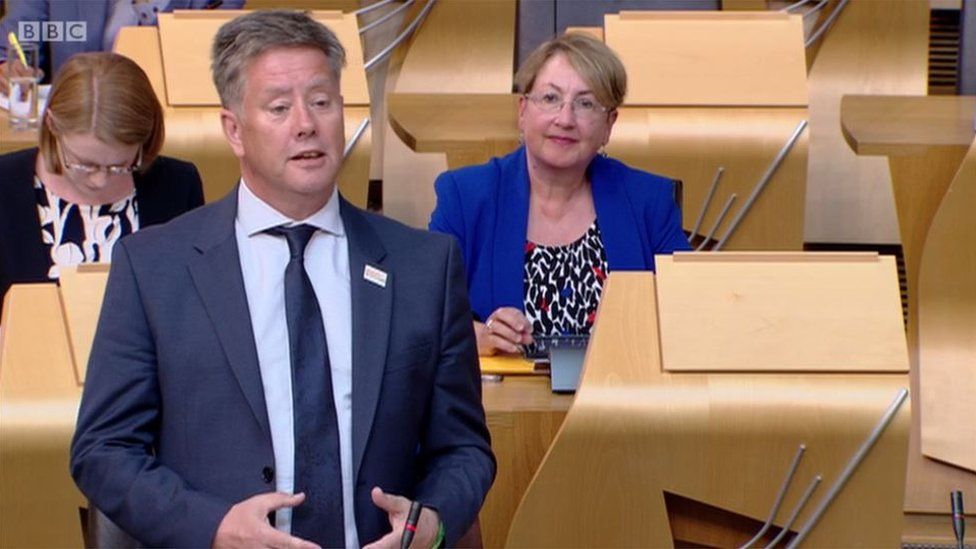Keith Brown outlines government plans for Scottish economy
- Published

The Scottish government's first dedicated economy secretary has set out his plans to make the country more productive.
Keith Brown was appointed to the new role by Nicola Sturgeon in a Cabinet reshuffle after the election.
He said innovation and investment, together with tackling inequality, could help to boost the economy.
Mr Brown also pledged a "clear and unrelenting focus" on creating a competitive environment for business.
Holyrood held its first economy debate of the new parliament on Tuesday afternoon.
Mr Brown used the debate to stress that "despite uncertain global conditions, and falling oil prices, our economy has continued to grow over the last year".
Mr Brown said the "fundamentals of our economy remain strong", but added that "we must substantially build on this position to help our firms and our people reach their full potential".
Mr Brown said he would listen to any "constructive ideas" on how to support economic growth put forward by MSPs from across the Holyrood chamber.
He said Scotland was already a "very attractive location for business growth and inward investment", pointing to research last week which ranked Scotland second to London for overseas investment across the UK.
Mr Brown added: "That is why we'll aim to raise productivity and prosperity through the traditional drivers of investment in infrastructure, skills and innovation."
The economy and finance briefs had both previously been the responsibility of John Swinney - but the posts were split when Mr Swinney was appointed as the new education secretary, with Mr Brown becoming economy secretary and Derek Mackay finance secretary.
The Conservatives used the debate to call for changes to be made to the Land and Buildings Transaction Tax (LBTT), which has replaced stamp duty on property sales in Scotland.
The party's finance spokesman Murdo Fraser insisted charges had been set too high, causing "a slowdown in the housing market at the upper ends, and a decline in tax revenues".
But he said that "even a minor tweak could end the stagnation and bring in more, much needed, tax revenue".
Mr Fraser also quoted Liz Cameron, chief executive of the Scottish Chambers of Commerce, saying that the Scottish economy was "on a knife edge"
For Scottish Labour, Jackie Baillie also called for a change in the SNP's economic strategy.
She said the government was good at congratulating itself, but had made "very little progress" on the economy in nine years in government.
Ms Baillie set out six steps she wanted the government to take, including a review of business rates, a new industrial strategy, new focus on cities as "the engine rooms of the Scottish economy and investment in infrastructure to improve connectivity.
'Lack of ambition'
Lib Dem leader Willie Rennie called on the government to "come out of the timid corner it has been hiding in with its lack of ambition for growing our economy".
He said the SNP had been "far too timid" and called for new measures to address mental health, which he said would help people get back to work, alongside investment in education and infrastructure to grow the economy.
Mr Rennie also attacked the government over its memorandum of understanding with Chinese firms.
Meanwhile, Green MSP John Finnie called for more investment in decommissioning, renewables and energy efficiency programmes to counter the challenges faced by the oil and gas sector.
He said: "The decline of the oil and gas sector must be met with a managed transition to new industries rather than ever deeper tax cuts to encourage the extraction of resources that are ultimately unburnable.
"By investing now in viable alternatives such as decommissioning, renewables and energy efficient housing, we can transfer workers' skills and provide the long-term stability local economies across urban and rural Scotland need."
- Published24 May 2016
- Published18 May 2016